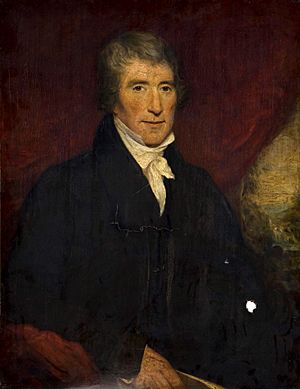Robert Tennent (physician) facts for kids
Robert Tennent (sometimes spelled Tennant) (1765–1837) was an important Irish doctor, businessman, and helper of others in Belfast. He was known for his strong beliefs in fairness and change. After Ireland joined with Great Britain, he often disagreed with the powerful people in charge. He helped start many important groups. Two of the most lasting were the Royal Belfast Academical Institution (a famous school) and what is now the Royal Victoria Hospital, Belfast.
Contents
Robert Tennent's Life Story
Early Life and Beliefs
Robert Tennent was born on August 9, 1765, in Ballymoney, County Antrim. His father, Reverend John Tennent, was a Presbyterian minister. His family believed in a type of Presbyterianism called "Anti-Burgher." This group disagreed with certain rules of the main church in Scotland.
In Ireland, these rules meant that only members of the Church of Ireland could hold important jobs. This was called the Protestant Ascendancy. Presbyterians and Catholics were often left out. The Tennent family's refusal to accept these rules showed their desire for more fairness.
Robert's father supported the Northern Star newspaper. This paper was linked to the Society of United Irishmen. This group wanted to unite Irish people of all religions and reform the government. Robert Tennent shared these ideas, even though he kept his family's traditional religious views.
Time Overseas and Return
During the 1790s, when the French Revolution inspired calls for democracy, Robert Tennent was away from Ireland. He trained as a doctor and worked in the West Indies, especially Jamaica. This area had strong trade links with Belfast.
In 1793, he became a surgeon in the Royal Navy. He saw a naval mutiny (when sailors rebel against their officers) in South Africa in 1797. He felt sympathy for the sailors involved.
Robert returned to Belfast in 1799. This was after the Irish Rebellion of 1798 had been put down. His younger brother, John, had joined Napoleon's army in France. His older brother, William, was a prisoner. Robert helped manage William's business, a sugar factory. After William was freed in 1802, Robert started his own medical practice. He became a respected doctor in Belfast.
Helping the Community
Robert Tennent and his brother William, along with other doctors, became very active in Belfast. They helped many charities and groups. These included the Belfast Charitable Society and the Belfast Dispensary and Fever Hospital (which later became the Royal Victoria Hospital, Belfast). They also supported the Linen Hall Library and the Royal Belfast Academical Institution.
These men were part of a group who wanted to improve Belfast. They believed they were the "natural leaders" of the town. They wanted to see more fairness and change.
In 1808, Robert Tennent helped start the Belfast Monthly Magazine. This magazine spoke out against unfair rents and slavery. It also criticized the government's actions and pushed for equal rights for Catholics.
Standing Up to Power
In 1813, Tennent and his friends formed the "Friends of Civil and Religious Liberty." They wanted an investigation into violence that happened during the Twelfth of July celebrations. Two Orangemen had killed two people who were protesting. The Orangemen received light sentences. This made Tennent and his group very angry.
Many Presbyterians felt that the Orange Order (which was mostly Church of Ireland members) supported the powerful landowners. At a town meeting, a local vicar insulted Robert's brother, William. Robert grabbed the vicar's arm and was arrested. He was sent to prison for three months.
Even after this, Robert Tennent was not afraid to speak his mind. He became the chairman of the Royal Belfast Academical Institution's board. This school was meant to be open to all students, no matter their background. It also aimed to teach in a more modern way.
At a school dinner, Tennent gave a speech. He spoke about passing on the spirit of freedom and reform to new generations. He then led toasts to revolutions in France and South America. He also toasted "the exiles of Erin" (Irish people who had left Ireland) in the United States. These toasts were very bold and caused problems with the government. The government stopped giving money to the school for a while.
Beliefs on Business and Charity
Like many other business people and professionals in his group, Robert Tennent believed in liberal ideas about money and trade. In 1829, he refused to give money to help struggling weavers. He believed that giving money would keep wages low and hurt the local job market. He thought it was better to encourage hard work and self-reliance.
Family Life
Robert Tennent married Eliza McCrone. She died after giving birth to their son, Robert James Tennent, in 1803. In 1824, Robert James went to help the Greeks in their fight for independence. He felt strongly about freedom, remembering what his own country had gone through.
When he returned to Belfast, Robert James married a niece of Henry Joy McCracken, a famous Irish rebel. He became a leader in the "Friends of Civil and Religious Liberty." He also worked to get equal rights for Catholics. He later became a Member of Parliament.
Robert Tennent died on January 9, 1837. His brother William had died in 1832. His brother John, who was an officer for Napoleon, had been killed in battle in Germany in 1813. This was the same day Robert was arrested at the town meeting in Belfast.
Images for kids
 | Kyle Baker |
 | Joseph Yoakum |
 | Laura Wheeler Waring |
 | Henry Ossawa Tanner |



